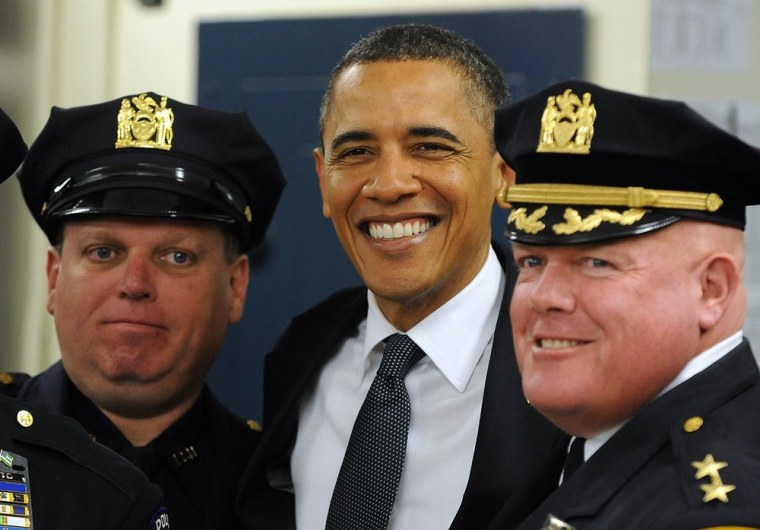This week’s stunning news of the death of Osama bin Laden gave President Barack Obama a much-needed bounce in voter opinion polls just as the 2012 president campaign grinds into gear.
But the glow could fade if job growth doesn't accelerate.
The government reported Friday that employers added more than 200,000 jobs for the third straight month, the biggest hiring spree in five years. But the politically sensitive unemployment rate rose to 9 percent from 8.8 percent, in part because some people resumed looking for work.
The economy has now created more than 1 million jobs since last October, a welcome relief from the millions of layoffs that accompanied the Great Recession. Still, the current pace of hiring isn’t nearly fast enough to bring unemployment back to anything like “normal” levels by Election Day.
“We're trying to regain a large number of net jobs that have been lost, and at this pace it will take a very long time to regain our previous peak,” said Joel Prakken, chairman of Macroeconomic Advisers.
The economy added 244,000 jobs in April, a bit more than expected, as r etailers, factories, financial companies, schools, health care facilities and construction companies all added jobs, the Labor Department said. Government jobs were lost at the federal, state and local level.
T he unemployment rate rose for the first time since November, althought the White House pointed out that it has fallen from 9.8 percent since then.
“Of course there are going to be some bumps up and bumps down,” said Austan Goolsbee, Obama’s chief economic advisor. “If you look at the trend, it’s clearly moving the right way.”
Still, voter worries about the sluggish pace of hiring can never be far from Obama's mind, even as he enjoys a victory lap after the successful commando raid on bin Laden's compound in Pakistan.
Obama got a huge boost in his overall approval rating after the bin Laden killing, but only 34 percent of those surveyed approve of his handling of the economy, the lowest level of his presidency, according to a New York Times/CBS poll released this week.
The renewed slide in home prices, a surge in gas prices and gridlock over federal spending mean that the president’s Republican opponents won’t have to look far for talking points.
All five candidates who participated in the first Republican presidential debate Thursday night cited the weakness of the economy as one of the Obama administration's major failings.
"We're in big trouble. Prices are going up, unemployment is continuing to go up," said Rep. Ron Paul, R-Texas, calling the economy Obama's biggest vulnerability.
This wasn't part of the White House re-election script. Technically the economic recovery has been under way for nearly two years, a point in the cycle that generally means strong expansion and a favorable political tailwind.
But the current pace of hiring is barely keeping up with the growth of the workforce, much less make an impact on the millions of workers sidelined in the worst recession in a generation. The economy slowed again in the first quarter, with gross domestic product crawling forward at a measly 1.8 percent rate, down from 3.1 percent in the previous quarter.
Stimulus spending
The White House points to the massive stimulus spending enacted shortly after Obama took office as a critical reason the economy is back on an upward path at all. Fueled in part by a big jump in worker productivity, corporate profits are up. So are stock prices.
Obama’s political opponents have been quick to seize on sluggish job growth as evidence that the administration's historic stimulus package of spending and tax cuts didn’t work. Economists are divided on the subject.
Most worrisome for the administration is that the public is most impatient about economic forces over which the president has the least control.
With the stimulus package winding down and state and local governments slashing payrolls, there is little the federal government can do to slow the resulting layoffs. Despite generally good marks for the policy response to the uprising in the Arab world, the White House can do little to lower the market price of oil -- although oil fell sharply on financial markets this week.
Worst of all for the administration, the financial collapse of 2008 inflicted damage to the economy that is proving to be more severe and long-lasting than tamer boom-bust cycles that other presidents have successfully navigated. That's why, some economists predict, the pace of hiring will continue to disappoint in the months leading up to the election.
If so, it’s a good bet that Obama’s poll numbers will reflect the subpar hiring that this recovery generates.
“Long-term history tells us after a financial collapse like we've seen, we're going to see a very, very grudging and long-term recovery,” said Jerry Webman, chief economist at Oppenheimer Funds. “This is not what we've seen during a post war period. We shouldn't be surprised, but it is disappointing when we look at these numbers.”
